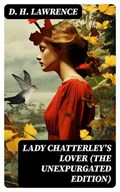D. H. Lawrence's "Lady Chatterley's Lover" (The Unexpurgated Edition) offers a controversial yet profound exploration of love, sexuality, and the human condition against the backdrop of post-World War I society. Written in a lush, poetic style, the novel intertwines passionate prose with keen psychological insight, vividly depicting the clandestine affair between Constance Reid, an upper-class woman, and Oliver Mellors, a working-class gamekeeper. Its unexpurgated version restores the bold, frank discussions of sensuality that Lawrence originally intended, challenging societal norms and expectations regarding class and intimacy, a theme resonant with the burgeoning modernist movement of the early 20th century. D. H. Lawrence, an emblematic figure of modern literature, often drew from his own tumultuous experiences and radical ideas about relationships and individuality. Born in 1885 in Eastwood, England, Lawrence faced societal constraints that informed his exploration of sexuality and the quest for personal freedom, both themes prevalent in this novel. His own struggles with the conventional morality of his time ignited a desire to break free from societal shackles, which he vividly articulates through his characters. "Lady Chatterley's Lover" is essential reading for those intrigued by the complexities of human relationships and the forces that shape them. This unexpurgated edition invites contemporary readers to engage with Lawrence's daring vision of love unbound by class restrictions, making it an indispensable addition to the canon of modern literature.

